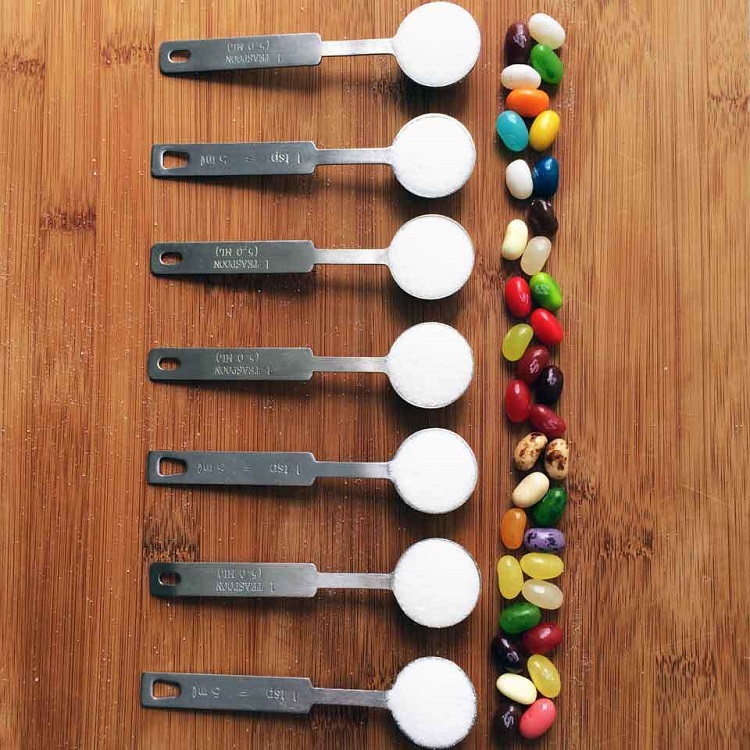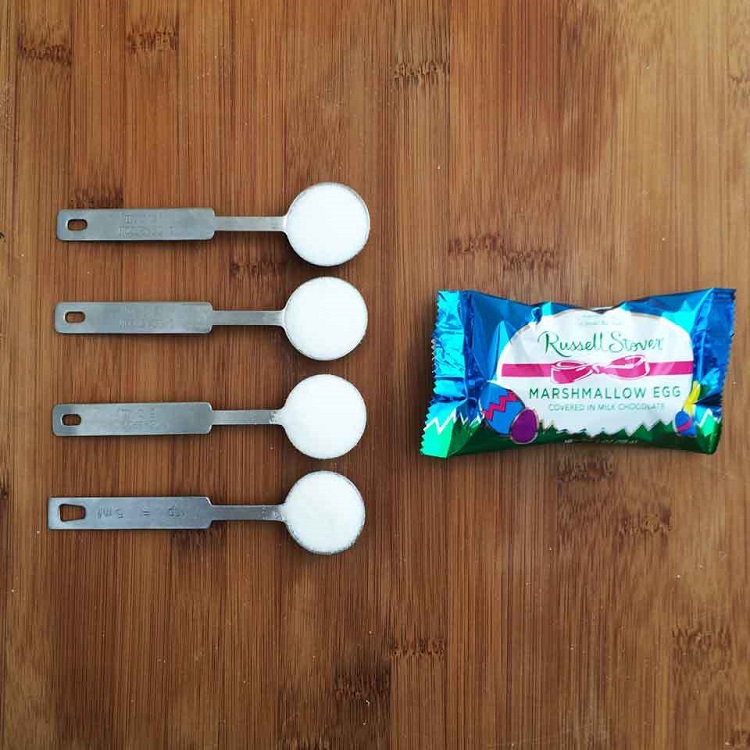Find out why too much added sugar is bad for you in the video below.
Video credit: EatingWell Magazine
While these prettily-wrapped delicacies are certainly tempting, it would be prudent to ask just how much sugar you’re taking in as you enjoy them. After all, even a few of those bite-sized candies can contain more than a handful of sugar, definitely over the recommended daily limit (which is 10 percent of calories or about 6 teaspoons of sugar for women and 9 teaspoons for men).
Gaining those extra pounds is the least of your problems because too much sugar can cause insulin spikes and over the long-term can increase your risk for diabetes and obesity. Even on an ordinary day, the average American already gets 270 calories from added sugars or the equivalent of nearly 17 teaspoons of sugar.
Below is a list of candy classics and how much sugar they really contain. The labels measure sugar in grams and 4 grams equal to 1 teaspoon of sugar. Nearly all of that is added sugar except for trace amounts of natural sugar, like lactose, that are found in some of the milk chocolate.
Looking at these figures may make you think twice before gulping down any of these sweets.
1 – Jelly Beans
28 g sugar (7 teaspoons)
35 beans (40 g): 140 calories, 0 g total fat, 0 g sat fat, 0 g trans fat, 0 g cholesterol, 15 mg sodium, 37 g carbohydrate, 0 g fiber, 0 g protein.
2 – Cadbury Mini Eggs
28 g sugar (7 teaspoons)
12 pieces (41 g): 190 calories, 7 g total fat, 4.5 g sat fat, 0 g trans fat, 5 mg cholesterol, 30 mg sodium, 29 g carbohydrate, <1 g fiber, 2 g protein.
3 – M&M’s Milk Chocolate Eggs
27 g sugar (7 teaspoons)
1/4 cup (42 g): 210 calories, 9 g total fat, 5 g sat fat, 0 g trans fat, 5 mg cholesterol, 30 mg sodium, 30 g carbohydrate, 1 g fiber, 2 g protein.
4 – Peeps Marshmallow Bunnies
26 g sugar (6.5 teaspoons)
4 bunnies (31 g): 110 calories, 0 g total fat, 0 g sat fat, 0 g trans fat, 0 mg cholesterol, 10 mg sodium, 28 g carbohydrate, 0 g fiber, 1 g protein.
5 – Cadbury Creme Eggs
20 g sugar (5 teaspoons)
1 egg (34 g): 150 calories, 6 g total fat, 4 g sat fat, 0 g trans, <5 mg cholesterol, 15 mg sodium, 24 g carbohydrate, 0 g fiber, 2 g protein.
6 – Dove Dark Chocolate Eggs
20 g sugar (5 teaspoons)
6 eggs (43 g): 220 calories, 14 g total fat, 8 g sat fat, 0 g trans fat, 5 mg cholesterol, 0 mg sodium, 26 g total carbohydrate, 3 g fiber, 2 g protein.
7 – Russell Stover Marshmallow Eggs
14 g sugar (4 teaspoons)
1 egg (28 g): 110 calories, 3 g total fat, 2 g sat fat, 0 g trans fat, 0 mg cholesterol, 30 mg sodium, 20 g total carbohydrate, 1 g fiber, 1 g protein.
8 – Reese’s Peanut Butter Eggs
8 g sugar (2 teaspoons)
1 egg (17 g): 90 calories, 5 g total fat, 2 g sat fat, 0 g trans fat, 0 mg cholesterol, 65 mg sodium, 9 g total carbohydrate, <1 g fiber, 2 g protein.
* These are for the snack-sized eggs. The larger (individually sold) eggs are twice as big with double the calories and sugar.
Recommended Video!
“How To Bake A Delicious Triple-chocolate Cheesecake With No Oven”










